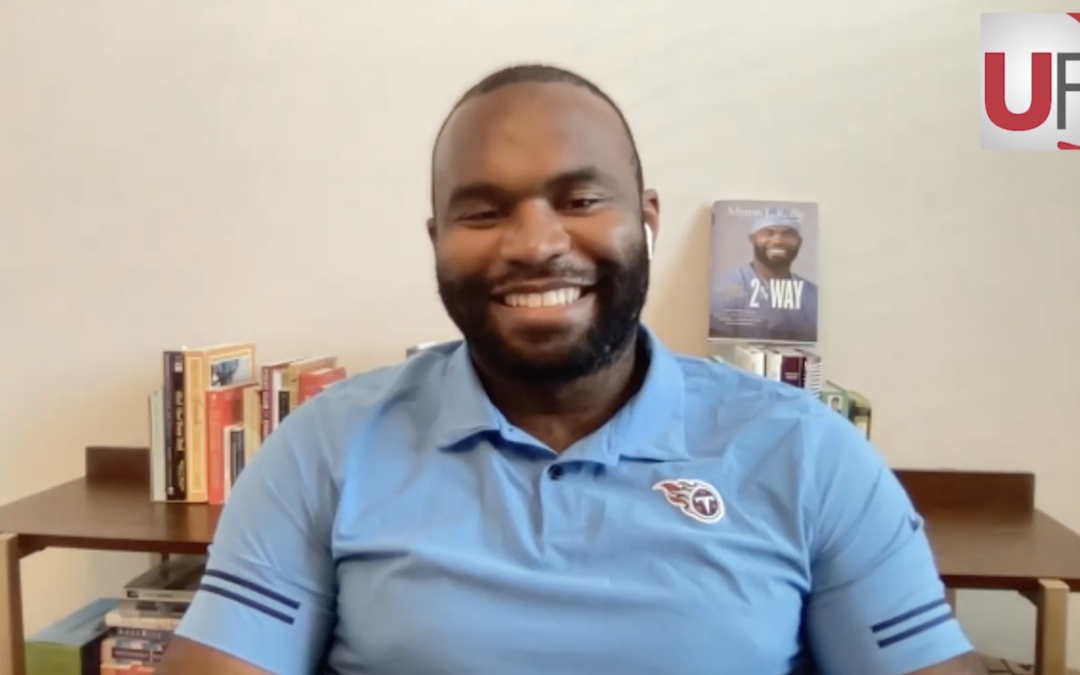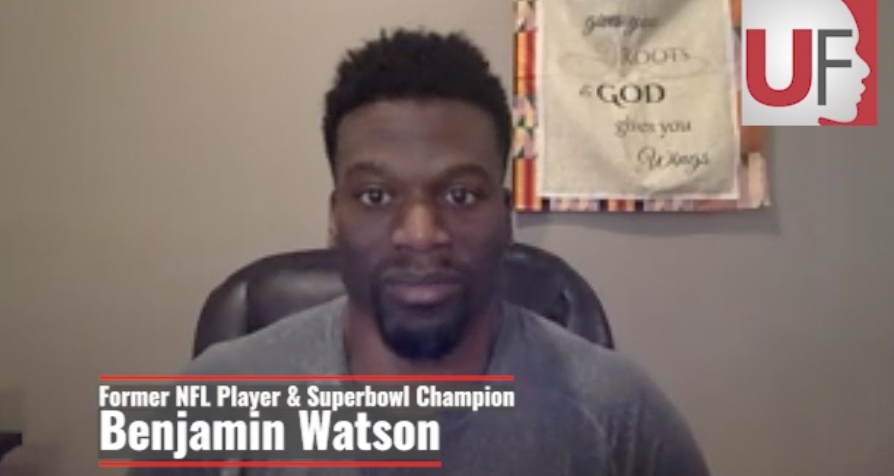by Julian DeShazier | Dec 16, 2011 | Entertainment, Feature, Headline News |

TO GOD BE THE GLORY: Denver Broncos starting quarterback Tim Tebow offers up a prayer to God before a recent game versus the San Diego Chargers. His gesture of Christian devotion has become known as "Tebowing." (Photo: Michael Zito/Newscom)
In 2009, the Word of the Year was tweet; In 2010, it was app (both are better than 1999’s winner — you guessed it — Y2K). Words like “gleek” and “drone” will no doubt occupy (my personal favorite) the 2011 shortlist, but the wordologists better make room for a late surge by two serious candidates: Tebowing and Tebowmania.
Call it a fourth-quarter comeback.
The question about Denver Broncos star Tim Tebow is not (for once) whether he is a good QB. He wins games, and that’s good enough for me. He wins ugly, but with six fourth-quarter comeback wins in 2011 alone, Tim Tebow has become a phenomenon. His jersey sales are through the roof; ESPN spends at least four hours of daily programming dedicated to his name; and, for better or worse, Tim Tebow is the most polarizing name in sports (I just heard LeBron James sigh in relief).
Let’s be honest: Most of the love/hate relationship that fans and critics express regarding Tebow has nothing to do with sports. This is about a man’s faith — which for some is inspiring, and for others sickening. This is about a man who does more than wear Jesus on his sleeve; he draws Scripture verses under his eyes. Some people say it’s too much.
There’s nothing odd about Tim Tebow’s public displays of faith (PDF). He is “on fire” in just about every way that evangelicals use the term: unapologetic, loud, and inspiring. He begins most every statement in true Grammy-fashion: “First of all, I want to thank my Lord and Savior Jesus Christ …” We knew who Tebow was back in high school — he is devout and virginal and has superior character to match his athleticism.
If you are a Christian, there’s a lot to LOVE about Tim Tebow. I know pastors who applaud Tebow for his abandon of spiritual censorship: he loves Jesus and he doesn’t care what you think (shouldn’t we all be so faithful?). Lately though, I’ve been wondering if his abandon is reckless abandon, and if his public displays of faith are doing more harm than good.
It began after one of his signature fourth-quarter wins where — while still on the field — a reporter approached him, breathless and in amazement, asking a very simple question, “How are you able to continue doing this?” Tebow replied with stone eyes, “My God is Big.” Whoa. He made that exact phrase a few more times, mixing in some thoughts about defense, finally closing with, “I serve a big God.” (Cringe.) Then last week, one teammate of his reported that Tebow said God speaks to him during the games. That’s when I decided that I would side with the critics — Would you just shut up already?!? — and for altogether different reasons.
My basic concern about PDF is that it is an ironic conquest. Openly giving God the credit for “miracles” seems to be exactly the opposite of what Jesus himself wished. There’s Mark 7:36 (and 8:30), and Luke 5:14 — “go and tell no one what has happened.” But then there’s Mark 5:14 — “go home and tell your friends” — so the “Messianic Secret” is far from answered, even in the Gospels. It seems to me, though, that the overwhelming portrait is of a quiet and humble Jesus who doesn’t want to be thanked at award shows or after athletic contests. Not because God isn’t worth recognizing, but something more dangerous happens when we too readily open our mouths in the Winner’s Circle. God becomes a “God for Winners.”
The most famous story of this is with Michael Chang, a tennis prodigy who at 17 was the youngest player to ever win the French Open. At the press conference, when asked how he was able to defeat Stefan Edberg, Chang replied, “I won because of the Lord Jesus Christ.” Well, he’s giving God glory, right? No, (according to John Feinstein, who reported deeply on this in 1989) Chang believed that his victory was the result of his having a closer personal relationship with Jesus than Edberg did. He honestly believed that.
Tebow and Chang are of the same evangelical cloth; we have to wonder if Tim Tebow believes his wins are the direct result of his personal relationship with God. His PDF is beginning to convince me he does. So what’s wrong with that?
God — if we may so feebly name the divine — is not a “Winner’s God.” More than half of the Bible is written for an audience that is losing, whether it be in culture, politics, or economics. In fact, by all societal standards (and messianic expectations), Jesus fails. And despite the adrenaline rush of victory, there’s nothing wrong with NOT winning. Hearing Tim Tebow only after victory may send an uncritical message about our “big” God: He creates and loves winners.
What about the losers of our society, the poor and the politically oppressed? Does God only love the 1%? Is this “God” only on one sideline, rooting against those with lesser faith? Is God BIG for Tebow and small for Marion Barber?
I don’t want to believe that God cares that much about sports: that would break my heart considering how much real pain and suffering yet remains in this world. And I certainly don’t want to believe that God loves only the winners, as the poisonous Prosperity Gospel proclaims (that would explain the Cubs’ “curse,” though. Hmm …). But that’s the impression we get from these snapshots of Tebow’s faith. Admittedly, he probably needs to break it down further, and a press conference is not the time.
So rather than a half-baked faith, I say to Tim Tebow: SHUT UP ALREADY! Not for me, but for the teenager who idolizes you and prays and fasts before games, just like you do, believing that God will “show up” for him on the field. When that young man loses, it won’t be because of the size of his God, it will be because the other team was better on that day (and even in defeat, To God Be the Glory).
We didn’t hear much about Chang’s God when he started losing. I wonder if the same will be true for Tim Tebow, though we may not find out this season. When the defenses do finally catch up to Tebow, will it be bad for Faith as well? That’s my only concern.
I’m looking to be converted on this one.
by Anthony B. Bradley | Jul 12, 2011 | Feature, Headline News |

Growing up in Atlanta the emphasis in my home and church community, outside of a relationship with the God, was education. In fact, since slavery the black community has valued education as the means of economic empowerment and political liberation. Education is so powerful that slaves were forbidden to learn how to read and write for hundreds of years in this country. Many of us had parents, grandparents, aunts, and uncles drill these words into our heads: “get an education.” Sadly, many black communities have been sabotaged with the deception of short-term gratification so that the empowerment brought through education is no longer valued. In the place of education has emerged an emphasis on entertainment and sports as the primary means of upward social mobility that many find troubling. In particular, an overemphasis on sports has dire consequences for black males.
In 2010, Dr. Krystal Beamon, assistant professor of sociology at the University of Texas at Arlington, wrote a fascinating article explaining the phenomena of black males being herded into sports. In “Are Sports Overemphasized in the Socialization Process of African American Males?,” Dr. Beamon explains that there has been elevated levels of sports socialization in the family, neighborhood, and media in the black community creating an overrepresentation of black males in certain sports. One of the results of this overemphasis, according to Beamon, is that black males may face consequences that are distinctly different from those who are not socialized as intensively toward athletics, such as lower levels of academic achievement, higher expectations for professional sports careers as a means to upward mobility, and lower levels of career maturity. In other words, the sports emphasis is putting black males at a disadvantage later on in the marketplace.
Much research has demonstrated that, compared to their white counterparts, black males are socialized by family and community members deliberately into sports, limiting their exposure to other hobbies, like reading, and to non-sports related role models early in life. In some families, for example, parents are more interested in basketball practice than homework completion or good grades. The overemphasis also continues to feed stereotypes about black men as athletes, and these stereotypes are exacerbated as the mass media limits projections of black males as working in professional, non-athletic, or non-entertainment vocations.
A recent NCAA study reports that high school athletes have a 0.03 percent chance of playing in the NBA and a 0.08 percent change of playing in the NFL. With these odds, many black males are being inadvertently sabotaged if their families and communities socialize them into sports as a way to become successful and escape poverty in the absence of forming them morally and educationally.
What is needed are new role models and peers that reinforce the virtues that form and shape character and equip young men to be successful in the marketplace, whether they play sports or not. If black males are to be protected from the sabotage of hopelessness, the pursuit of accelerated upward mobility, materialism, and so on, individual Christians have to get more involved in the lives of black youth to nurture a broader imagination for the purpose of one’s life beyond being famous, making money, and achieving physical prowess.
If education is not emphasized as the means of success, if learning is not celebrated, if the exploration of multiple hobbies and opportunities are not encouraged, we may be inadvertently setting a trap for self-destruction, because the consequences of not being prepared to participate in the global marketplace are serious.
Photo illustration by Mike O’Dowd.




